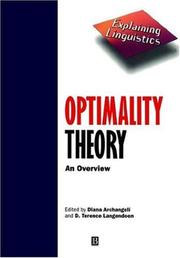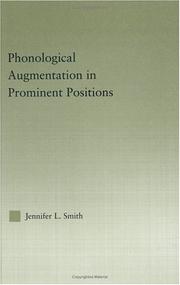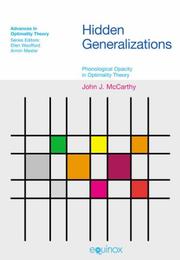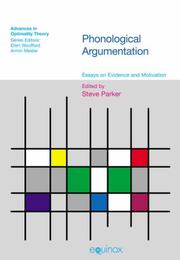| Listing 1 - 10 of 55 | << page >> |
Sort by
|
Book
ISBN: 9780511613333 9780521791946 9780521796446 0511613334 Year: 2002 Publisher: Cambridge, United Kingdom: Cambridge University Press,
Abstract | Keywords | Export | Availability | Bookmark
 Loading...
Loading...Choose an application
- Reference Manager
- EndNote
- RefWorks (Direct export to RefWorks)
This book describes Optimality Theory from the top down, explaining and exploring the central premises of OT and the results of their praxis. Examples are drawn from phonology, morphology, and syntax, but the emphasis throughout is on the theory rather than the examples, on understanding what is special about OT and on equipping readers to apply it, extend it, and critique it in their own areas of interest. To enhance the book's usefulness for researchers in allied disciplines, the topdown view of OT extends to work on first- and second-language acquisition, phonetics and functional phonology, computational linguistics, historical linguistics, and sociolinguistics. Furthermore, to situate OT for those coming from other traditions, this book also contains much discussion of OT's intellectual origins, its predecessors, and its contemporary competitors. Each chapter concludes with extensive suggestions for further reading, classified by topics, and supplemented by a massive bibliography (over 800 items). The book ends with a list of frequently asked questions about Optimality Theory, with brief answers and pointers to a fuller treatment in the text.--
Book
ISBN: 3860577212 9783860577219 Year: 2000 Publisher: Tübingen: Stauffenburg,
Abstract | Keywords | Export | Availability | Bookmark
 Loading...
Loading...Choose an application
- Reference Manager
- EndNote
- RefWorks (Direct export to RefWorks)
Die von A. Prince, P. Smolensky und J. McCarthy seit Beginn der 90er Jahre entwickelte Optimalitätstheorie wird als die linguistische Theorie der Jahrtausendwende angesehen und hat über die Grenzen der Sprachwissenschaft hinaus breites Interesse gefunden. Dennoch existierte bislang noch keine systematische Einführung in die optimalitätstheoretische Syntax. Das vorliegende Buch schließt diese Lücke. Zentrale Elemente der Theorie wie Verletzbarkeit, Konflikt und Ordnung von syntaktischen Beschränkungen werden anhand von Beispielsätzen entwickelt – schwerpunktmäßig in empirischen Bereichen, in denen die Unterschiede dieser Syntax zu anderen Syntaxmodellen besonders deutlich werden. Damit liegt eine umfassende Darstellung der Möglichkeiten und Grenzen dieses neuen Syntaxmodells vor, dessen Kenntnis für all diejenigen unverzichtbar ist, die an moderner Grammatiktheorie interessiert sind.

ISBN: 0631202269 0631162569 0631202250 9780631202264 9780631162568 Year: 1997 Volume: 1 Publisher: Oxford Blackwell
Abstract | Keywords | Export | Availability | Bookmark
 Loading...
Loading...Choose an application
- Reference Manager
- EndNote
- RefWorks (Direct export to RefWorks)

ISBN: 0415971071 Year: 2005 Publisher: New York (N.Y.) : Routledge,
Abstract | Keywords | Export | Availability | Bookmark
 Loading...
Loading...Choose an application
- Reference Manager
- EndNote
- RefWorks (Direct export to RefWorks)
Grammar, Comparative and general --- Optimality theory (Linguistics). --- Psycholinguistics. --- Phonology.
Book
Year: 2005 Publisher: New York : Taylor & Francis,
Abstract | Keywords | Export | Availability | Bookmark
 Loading...
Loading...Choose an application
- Reference Manager
- EndNote
- RefWorks (Direct export to RefWorks)
Phonologically prominent or "strong" positions are well known for their ability to resist positional neutralization processes such as vowel reduction or place assimilation. However, there are also cases of neutralization that affect only strong positions, as when stressed syllables must be heavy, default stress is inserted into roots, or word-initial onsets must be low in sonority. In this book, Jennifer Smith shows that phonological processes specific to strong positions are distinct from those involved in classic positional neutralization effects because they always serve to augment the strong position with a perceptually salient characteristic. Formally, positional augmentation effects are modeled by means of markedness constraints relativized to strong positions. Because positional augmentation constraints are subject to certain substantive restrictions, as seen in their connection to perceptual salience, this study has implications for the relationship between functional grounding and phonological theory.
Grammar, Comparative and general --- Psycholinguistics. --- Optimality theory (Linguistics) --- Phonology.

ISBN: 184553574X 9781845535742 9781845530518 1845530519 9781845530525 1845530527 Year: 2007 Publisher: London Equinox Pub.
Abstract | Keywords | Export | Availability | Bookmark
 Loading...
Loading...Choose an application
- Reference Manager
- EndNote
- RefWorks (Direct export to RefWorks)
Hidden Generalizations is the first monograph devoted exclusively to the problem of phonological opacity. Opacity arises when the conditions for or results of an active phonological process are not evident in the speech signal. Opacity is particularly important in Optimality Theory, which lacks the standard means of analyzing opacity, rule ordering.
Grammar, Comparative and general --- Opacity (Linguistics) --- Optimality theory (Linguistics) --- Phonology.

ISBN: 1845535944 9781845535940 9781845532215 184553221X 9781845532208 1845532201 Year: 2009 Publisher: London Equinox Pub.
Abstract | Keywords | Export | Availability | Bookmark
 Loading...
Loading...Choose an application
- Reference Manager
- EndNote
- RefWorks (Direct export to RefWorks)
This volume presents a series of original papers focusing on the theme of phonological argumentation, set within the framework of Optimality Theory.
Optimality theory (Linguistics) --- Grammar, Comparative and general --- Morphology. --- Phonology.
Book
Year: 2005 Publisher: New York : Taylor & Francis,
Abstract | Keywords | Export | Availability | Bookmark
 Loading...
Loading...Choose an application
- Reference Manager
- EndNote
- RefWorks (Direct export to RefWorks)
Phonologically prominent or "strong" positions are well known for their ability to resist positional neutralization processes such as vowel reduction or place assimilation. However, there are also cases of neutralization that affect only strong positions, as when stressed syllables must be heavy, default stress is inserted into roots, or word-initial onsets must be low in sonority. In this book, Jennifer Smith shows that phonological processes specific to strong positions are distinct from those involved in classic positional neutralization effects because they always serve to augment the strong position with a perceptually salient characteristic. Formally, positional augmentation effects are modeled by means of markedness constraints relativized to strong positions. Because positional augmentation constraints are subject to certain substantive restrictions, as seen in their connection to perceptual salience, this study has implications for the relationship between functional grounding and phonological theory.
Grammar, Comparative and general --- Psycholinguistics. --- Optimality theory (Linguistics) --- Phonology.
Book
Year: 2005 Publisher: New York : Taylor & Francis,
Abstract | Keywords | Export | Availability | Bookmark
 Loading...
Loading...Choose an application
- Reference Manager
- EndNote
- RefWorks (Direct export to RefWorks)
Phonologically prominent or "strong" positions are well known for their ability to resist positional neutralization processes such as vowel reduction or place assimilation. However, there are also cases of neutralization that affect only strong positions, as when stressed syllables must be heavy, default stress is inserted into roots, or word-initial onsets must be low in sonority. In this book, Jennifer Smith shows that phonological processes specific to strong positions are distinct from those involved in classic positional neutralization effects because they always serve to augment the strong position with a perceptually salient characteristic. Formally, positional augmentation effects are modeled by means of markedness constraints relativized to strong positions. Because positional augmentation constraints are subject to certain substantive restrictions, as seen in their connection to perceptual salience, this study has implications for the relationship between functional grounding and phonological theory.
Grammar, Comparative and general --- Psycholinguistics. --- Optimality theory (Linguistics) --- Phonology.
Multi
ISBN: 9055690465 Year: 1998 Publisher: The Hague Holland Academic Graphics
Abstract | Keywords | Export | Availability | Bookmark
 Loading...
Loading...Choose an application
- Reference Manager
- EndNote
- RefWorks (Direct export to RefWorks)
| Listing 1 - 10 of 55 | << page >> |
Sort by
|

 Search
Search Feedback
Feedback About UniCat
About UniCat  Help
Help News
News